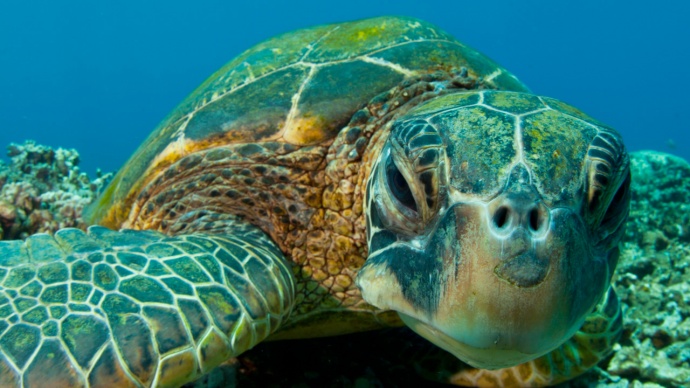Push to Restore Hunting of Hawaiian Turtles Underway
By Anne Rillero
In traditional Hawaiian culture, some families consider green sea turtles to be ‘aumakua, or personal deities. Snorkelers and divers cherish encounters with the docile marine reptiles readily found among Hawaii’s reefs.
Some Hawaii residents fondly recall when the turtles provided meat for their tables – and would like to be allowed to hunt them again.
Because Hawaii’s green sea turtles are listed as threatened under the US Endangered Species Act (ESA), it is illegal to harass, feed, hunt, capture or kill the turtles. The turtles – known as “honu” in Hawaiian – received this protection in 1978, following decades of commercial exploitation that caused their population to plummet, and the failure of a Hawaii state law passed in 1974 to reverse the decline.
A pending decision by National Marine Fisheries Service and US Fish and Wildlife could erase this federal protection, which would return the turtles’ management to the state.
The current review of the turtle’s status was triggered by a petition filed by the Association of Hawaiian Civic Clubs last February, which asked that Hawaiian green sea turtles be reclassified as a “distinct population segment” and that this distinct population be considered for “delisting” from the US Endangered Species list.
“For Hawaiians, the honu — if you remove the emotions — the honu gives us sustenance,” said Charles Kaaiai, speaking at the Maui Sea Turtle Symposium conducted last month by Pacific Whale Foundation. Kaaiai, a member of the civic clubs association, is the indigenous coordinator of the Western Pacific Regional Fishery Management Council, a federal organization that manages and implements laws governing fishing activity in Hawaii.
According to Kaaiai, who grew up hunting and eating turtles, the turtles’ population levels have recovered to the point that federal protections are no longer warranted.
Pacific Whale Foundation’s Conservation Manager Lauren Campbell, who also spoke at the symposium, disagreed. She pointed out that the number of turtles thought to be nesting each year in Hawaii still does not match sustainable recovery criteria, as stipulated in the Recovery Plan for the US Pacific Populations of the Green Turtle, a document created by the Marine Fisheries Service and US Fish and Wildlife.
According to Campbell, honu still face numerous threats, including “habitat loss due to sea level rise, entanglement in fishing gear, behavioral changes due to human interference, habitat alteration in foraging grounds due to coastal development, pollution of key habitat areas and high incidence of a tumor-causing disease known as fibropapillomatosis in certain foraging areas.”
The civic club association’s petition triggered steps mandated by the ESA, beginning with a 90-day initial review by the Fisheries Service and US Fish and Wildlife. On August 1, the agencies concluded that initial assessment, reporting “the petitioned action may be warranted” based on scientific and commercial information in Fisheries Service files.
A formal status review is now underway, to be completed by mid-February. “We are conducting this scientifically and objectively,” says Patrick Opay, Endangered Species Branch Chief of the Protected Resources Division, Pacific Regional Office of the Fisheries Service. “There is no assumption the turtles will be delisted; there is no leaning in any direction.”
If the turtles are delisted, an existing Hawaii law makes it illegal to hunt the turtles. Yet environmentalists believe delisting would be premature, and express concern about returning the turtles to the control of a state government struggling with limited funding for wildlife management.
The Fisheries Service and US Fish and Wildlife had accepted public input pertaining to the review prior to October 1, which brought more than 300 letters, postcards and testimonies, reported Opay.
“Many private citizens and environmental organizations have questioned the State of Hawaii’s ability to enforce a management plan that would continue to sustain honu populations,” wrote the Conservation Council of Hawaii in their testimony.
Cheryl King, Maui Research Coordinator of Hawaii Wildlife Fund’s Hawksbill Recovery Project, commented that living turtles have greater economic value in attracting visitors to the state.
“Announcing that turtles can be hunted again will cast a dark shadow over Hawaii,” she wrote, “A turtle slaughter would be a horrible thing for most families to witness, especially if they’ve experienced the beauty of watching them underwater.”
To submit a letter, or raise an important Maui issue that you feel we should investigate, send an email to editor@mauinow.com. Attach any relevant images to the email.







_1768613517521.webp)



